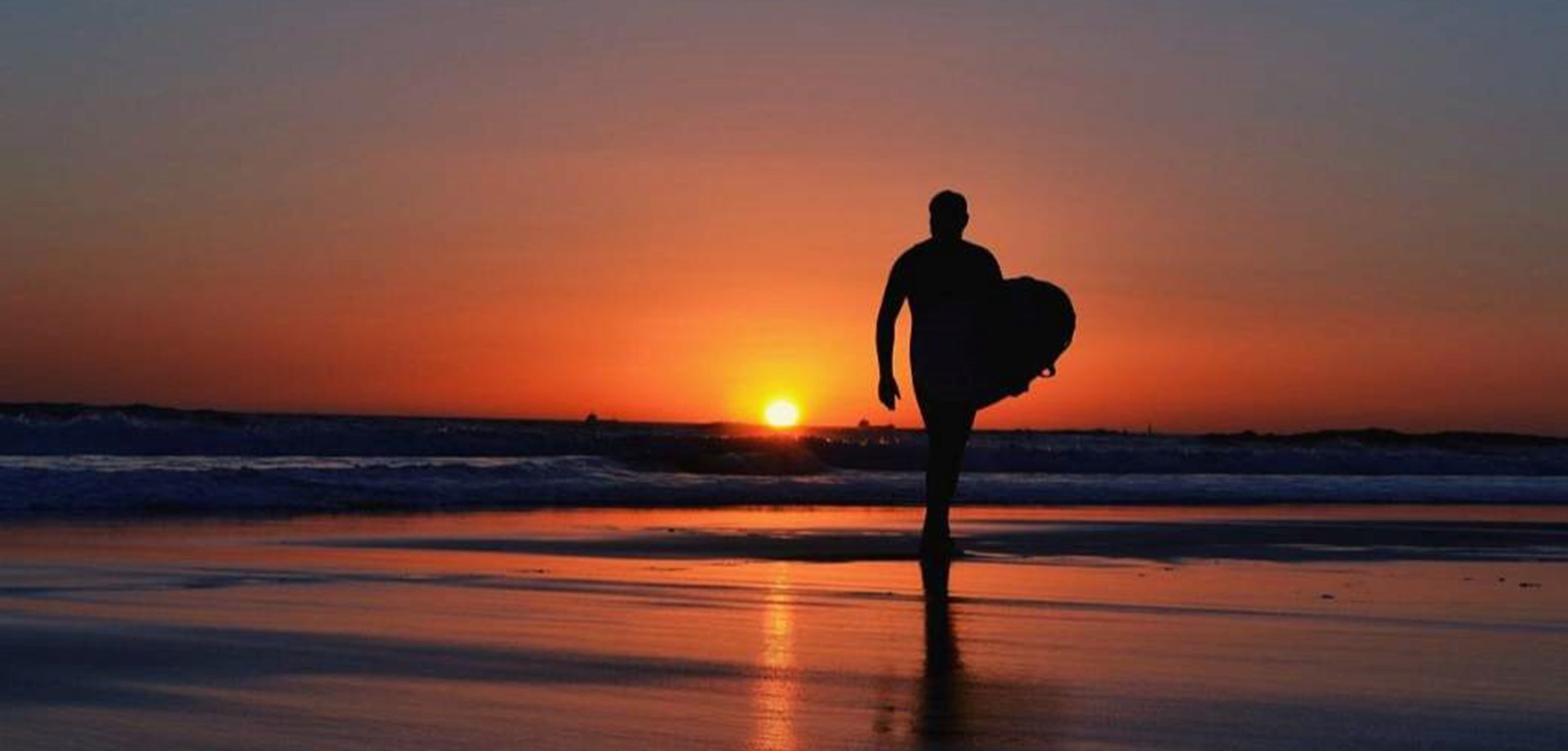Find out why the Algarve is a paradise for surfing and find the best beaches to practice it.
7 November 2023

When you visit the Algarve, it is quite possible to catch a glimpse of people with their surfboards. You can see them at the airport, on the roofs of cars, and of course, in the water. It can really be said that Portugal is the best surfing destination in Europe. Some even dare to compare Portugal with the world's best surfing destinations like Hawaii or Australia. So what makes it so special?
The guarantee of waves in the Algarve
The most famous locations for surfing in Portugal are located in the center and north of the country. But the Algarve has something that makes it unique: the guarantee of waves. As the Algarve is exposed to the Atlantic Ocean both to the west and south, you can find waves here almost 365 days a year. They may not be those perfect waves like you see in the movies, but they're there. So, if you book a holiday to surf in the Algarve, you can count on it every day, which is unthinkable in any other destination.

Surf Lessons
If you've never surfed before, you need some lessons. With the help of an instructor, you will not only learn faster, but also some safety measures. The instructor will teach you all the rules you need to know when you are in the water and how to prevent accidents and falls when you start practicing alone.
Most schools have one-day courses for those who just want to try it out. But if you really want to learn how to surf, you need an extended course. The surf schools have their own transport to take you to the beaches where the sea is better for learning.
Always book your lessons at licensed surf schools to ensure the best quality. Not all schools accept children under the age of 14, so check this if you plan to book classes for the whole family.

When is the best time to surf?
In the Algarve you can have guaranteed waves, but it is not easy to know where the best waves are on a daily basis. With numerous beaches, and each with its typical swell due to the tide or the wind, getting to know the best places requires time and dedication.
We will introduce you to some of the best beaches for surfing in the text below. For more details, a surf school or surf shop are the best places to get more information.
On most days, the waves hit the coast in a north-west direction. In general, they are smaller in the summer and larger in the winter. When the waves get too big and dangerous to surf on the west coast, they curve the "End of the World Tip" and reach all the way to the south coast.

On the south coast, the beaches start to have waves usually from the south – east or south – west, but these less frequently.
Are you coming for a getaway to the Algarve and surfing is on your list? If so, the best time is from May to October, anywhere in the Algarve, they are probably the best months for you. You may have to drive all the way to the west coast to find waves, but you might get lucky and catch some good waves south as well.
If you only want to take the beginner course, it may be best to stay on the south west coast of the Algarve and find a school or instructor in the area of Portimão, Sagres or Aljezur. Any month will do, although many schools close during January and February and the water temperature is still very cold in March.
Experienced surfers looking for bigger waves should avoid the summer months.

What are the most famous beaches for surfing?
As far as surfing is concerned, the Algarve can be divided into three coastlines: west, southwest, and central and southeast. The first two are more popular, but you'll find surfers everywhere. All of the beaches mentioned below are safe to surf at any level, easily accessible, and have restaurants, toilets, and lifeguards during the summer.
West Coast (Sagres – Sines)
The west coast of the Algarve almost reaches Sines, but the best area for surfing is in the area of Sagres, Carrapateira and Aljezur. Here you can always find waves and it is a trip that is done right from the center or east of the Algarve. All of the beaches below have surf shops or schools on the beaches.
Arrifana (Aljezur)
Follow the exit south of Aljezur. You can only park on the top street, but if you want you can get off to drop off things and passengers and then go park. The sea has some rocks when it's low tide. It needs northwest waves and is protected from the north wind.

Amado (Carrapateira)
Another beach that is protected from the north wind. You can find it south of Carrapateira and it will certainly be with a lot of people, but this beach has enough waves for everyone. The waves at Amado are generally larger and stronger than at Arrifana.

Castelejo/Cordoama (Sagres)
These two neighboring beaches are located just north of Sagres. They are more exposed to the north wind, but have the best and biggest waves (for experienced surfers). The sea here is quite rocky, so it's a good idea to go with the surf school or a guide. Make sure you are well informed before you enter

Southwest Coast (Sagres- Lagos)
Sagres and Lagos are the most popular Algarve cities among surfers, which probably has to do with their location (easy access to both the west and south coasts) and the fact that they are cities full of life. There are several small beaches between these towns but most are difficult to access and not advisable at all levels. The most suitable are:
Barrel (Sagres)
Although it's officially on the south coast, this beach is like it's in the west. Located right next to the center of Sagres, it offers a spectacular view when the waves get bigger, but avoid this if you are not an experienced surfer. There are some hidden rocks so be careful.

Zavial (Fox)
This beach is a bit hidden and is located south of the small village of Raposeira. This beach has good waves when the wind is northwest. It has some rocks on the right side which is advisable only for experienced surfers, while on the left side it is best for schools and beginners.

Port of Mós (Lagos)
Located south of Lagos, the waves here are a little smaller than in Zavial. The seabed has normally exposed rocky areas. On this beach, spider fish also predominate, a great enemy of surfers in the Algarve. The sea gets rougher on the right side, so it's best to stay on the left and walk as little as possible.

Meia Praia (Lagos)
This is the largest beach on this side of the Algarve and has plenty of water sports and activities to try in the summer. The occasional waves coming from the southeast make it a popular destination among surfers.

Centre and Southeast (Portimão – Tavira)
The central and southeast coast of the Algarve is known more for normal tourism than for surfing. So there aren't usually as many surfers. You should be very careful with swimmers, never surf in the areas intended for them and always show respect for other surfers.
Praia da Rocha (Portimão)
The waves at this beach on the right side of the river can come from the south or get bigger when they come from the northwest. The best place to surf is next to the pontoon, but it usually gets very crowded there. Less experienced surfers should catch better waves on the right side of the beach.

Falesia Beach (Albufeira – Vilamoura)
This beach is east of Albufeira and you can catch waves here when you come from the southwest. The seabed is sandy so iaao is safe for beginners. The waves here are usually gentle, but even experienced surfers like to catch them because when they are at the peak they can be quite strong.

Tavira Island (Tavira)
This island is located in front of Tavira and you can get there easily in a water taxi and then a good walk. In any case, it deserves a visit for its landscapes and when the waves come from the southeast, they form perfectly. Bring boards with you!

A word of advice
Surfing is a very popular sport and for good reason. If you are looking for an adventure sport, this is recommended. Please remember that any sport on the open sea brings dangers and responsibilities. The beaches mentioned above are usually good for beginners, but you should always be well informed about the risks, such as rocks that can appear with the changes in the tides. Don't catch waves alone if you haven't had enough lessons.
And above all, have fun!

If you need help booking surf lessons at Praia da Rocha or Sagres or renting equipment, contact us and we will be happy to help.


